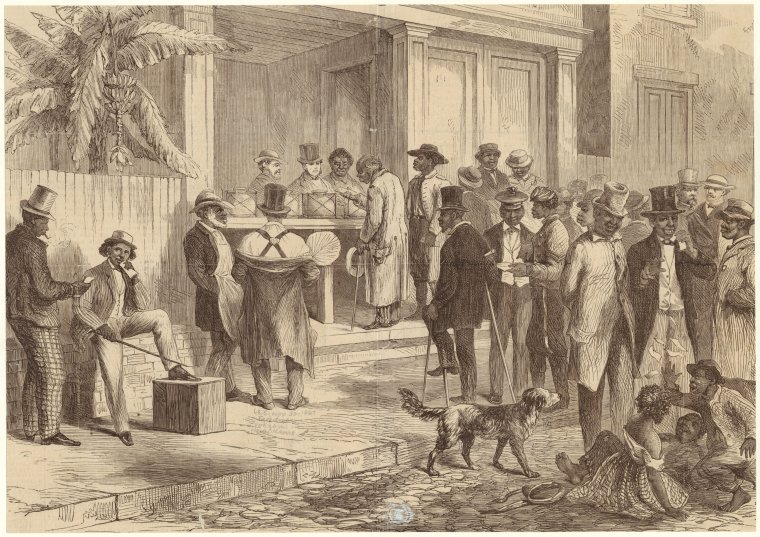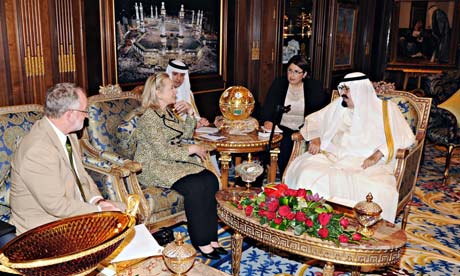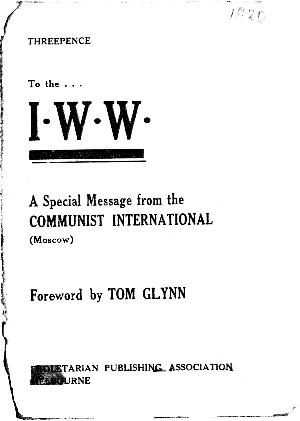history
United States: Far right and Republicans attempt roll back of constitutional equal rights

Former enslaved African Americans vote in New Orleans, 1867, during the "Radical Reconstruction" period.
By Malik Miah
May 25, 2012 – Links International Journal of Socialist Renewal -- The “Reconstruction amendments” — the 13th, 14th and 15th amendments to the United States constitution — are being targeted in many of the far-right “Tea Party” and Republican campaigns against the rights of immigrants and women, marriage equality and gay rights, and voting rights for African Americans and other minority ethnic groups.
The racist tinge of many of these attacks, whether openly stated or implied, is obvious – but this does not mean that racism is more prevalent now than in the past. Rather, the smear campaign against President Barack Obama’s mixed background and dark skin is calculated to appeal to the most extreme backward elements of the Republican Party.
The Arab uprisings, democratic demands and the Saudi payroll

Hillary Clinton (centre) meets King Abdullah of Saudi Arabia (right) in Riyadh to discuss Syria. Photograph: AP.
By Rupen Savoulian
May 21, 2012 -- Antipodean Athiest, submitted to Links International Journal of Socialist Renewal by the author-- In April 2012, a number of high-level political officials attended conferences in Paris and Istanbul organised by the Friends of Syria group. US secretary of state Hillary Clinton attended these meetings, and joined the foreign ministers from the NATO powers and Arab Gulf monarchies in denouncing the killings committed by the Syrian regime of Bashar al-Assad.
Lars Lih: How Lenin's party became (Bolshevik)
By Lars T. Lih
Who or what killed the US SWP?

The Party, The Socialist Workers Party 1960-1988, Volume I: The Sixties, a Political Memoir by Barry Sheppard, Resistance Books (Sydney), 2005, 354 pages.
The Party, The Socialist Workers Party 1960-1988, Volume II: Interregnum, Decline and Collapse, 1973-1988, a Political Memoir by Barry Sheppard, Resistance Books (London), 2012, 345 pages.
[For more discussion of the US SWP, click HERE.]
Review by Peter Boyle
How revolutionaries of Lenin’s time resisted austerity

Towards the end of 1921, an attempt was made to shift the burden of debt to the working class through higher sales taxes. The German Communist Party opposed this, demanding instead an increase in the tax on wealth and the seizure of assets.
Introduction by John Riddell
April 26, 2012 -- Links International Journal of Socialist Renewal/johnriddell.wordpress.com -- Economic collapse drives workers into hunger and destitution. Foreign powers extort huge payments, forcing the national economy toward bankruptcy. The government forces workers to pay the costs of capitalist crisis.
This description of Greece in 2012 applies equally to Germany in 1921.
How should a workers’ party respond to such a breakdown? The proposals of the German Communist Party (KPD) included a simple approach to fiscal policy: tax those who own the country’s productive wealth.
The KPD was then a member of the Communist International, whose leadership included V.I. Lenin, Leon Trotsky and Gregory Zinoviev.
Peter Camejo: Against sectarianism -- the evolution of the Socialist Workers Party, 1978-1983
AGAINST SECTARIANISM
The Evolution of the Socialist Workers Party 1978-1983
by Pedro (Peter) Camejo
Paul Le Blanc on Barry Sheppard’s memoirs: Revolutionary redemption, lessons for activists

Barry Sheppard in 1964.
By Paul Le Blanc
Doug Lorimer's introduction to 'Imperialism: The Highest Stage of Capitalism'
Introduction by Doug Lorimer



